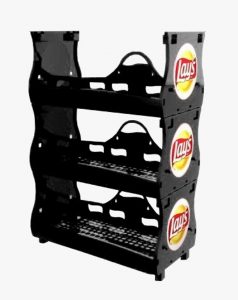Pop or soda, beer and food are displayed in stores and shipped around the world.
The displays are usually made from plastics that last forever, produced from oil-based resins. Shipping pallets for the goods are often treated with toxic chemicals to make them last.
Israel cleantech company UBQ Materials, however, makes displays and pallets by turning household waste into bio-based thermoplastic. And that now includes more items for big clients.
PepsiCo is expanding its use of UBQ across its supply chain with Lay’s potato chip stands across Europe. The food and beverage company also has ordered 30,000 more shipping pallets made with UBQ for use across Latin America.
Ambev, the Brazilian subsdiary of Anheuser-Busch InBev, also is integrating UBQ material into packaging. And Osem-Nestlé, one of Israel’s largest food manufacturers and distributors and a Nestlé subsidiary, is using pallets made with UBQ.
All of this is keeping waste, including organics, from ending up in landfills or being incinerated, says Albert Douer, UBQ chairman and co-CEO.

The company says that for every ton of UBQ produced, the equivalent of up to 12 tons of carbon dioxide are prevented from polluting the environment.
“The feedstock to create UBQ is residual municipal solid waste, everything that would have otherwise been sent to landfill or incineration: banana peels, baby diapers, pizza boxes, together with various mixed plastic,” Douer says.
UBQ also has been tapped by Pepsi Labs to support something called pep+, for PepsiCo Positive.
Pep+ is described as “a strategic end-to-end business transformation with sustainability and human capital at the center of how the company will create growth and value.” PepsiCo highlighted this in its 2021 Environmental, Social, and Governance (ESG) Summary.

“PepsiCo has committed to advancing a circular economy,” Douer adds.
“UBQ plays a key role in this by diverting waste, including all unrecyclable plastic packaging and organic waste that is found in the municipal waste stream and converting it into UBQ, which can then be looped back into the value chain for the manufacturing of items like the shipping pallets and display stands we are already creating.”
PepsiCo is synonymous with food and beverages, but steps they’re taking to address the sustainability of products can be easily replicated across industries, Douer says.
“UBQ is one material that has endless applications—everything from auto parts to construction and building. The more we use throughout the supply chain, the more waste we divert, the more CO₂ we prevent, the less oil-based resins we use, helping us preserve finite resources for future generations.”
UBQ helps produce stands and pallets by supplying processed materials to the manufacturer in a standardized pellet form. PepsiCo has its own circular packaging initiatives under the pep+ program and recycles packaging materials internally.
UBQ’s work was recognized earlier this year as the winner in the Speculative Design Category at the annual SXSW Innovation Awards.
With the latest developments, UBQ Materials is growing globally with its first large-scale facility in Bergen op Zoom, Netherlands, following a $170 million funding round led by TPG Rise Climate.
The building is described as a high-tech facility producing advanced materials for industry partners in the region.
“Our state-of-the-art lab will be equipped to simulate a wide variety of customer applications for trials and testing,” the chairman and co-CEO says.
“We have procured analytical equipment for monitoring and ongoing quality assurance that complies with the highest certified standards in the market.”
UBQ plans to hire about 140 professionals from local industry and the facility will have a capacity of more than 80,000 tonnes of UBQ per year, Douer says.
“Production will be driven by waste. So, we will be diverting local waste to drive local production. Many of our largest clients also have manufacturing bases in the region, which allows us to further localize the waste-material-production cycle.”
UBQ is reportedly looking at multiple additional sites for future facilities in Europe and the United States to keep up with demand.
Packaging 360 is a comprehensive knowledge sharing ecosystem for the Indian packaging industry. Our services include an online content platform to deliver news, insights and case studies; organising conferences seminars and customised training; Providing Bespoke Project Consulting, Market Research and Intelligence.







